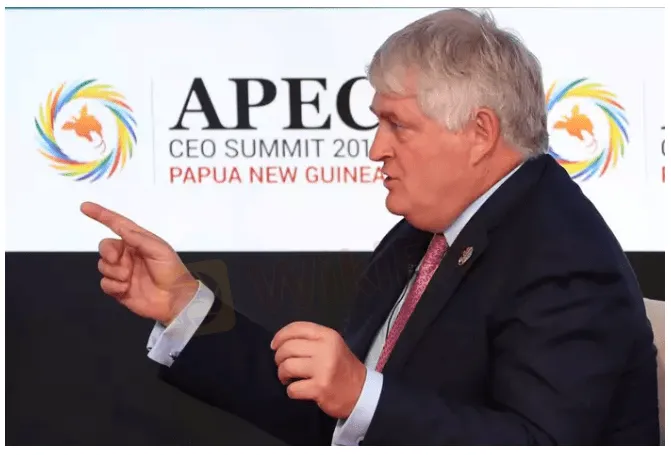简体中文
繁體中文
English
Pусский
日本語
ภาษาไทย
Tiếng Việt
Bahasa Indonesia
Español
हिन्दी
Filippiiniläinen
Français
Deutsch
Português
Türkçe
한국어
العربية
Digicel says ‘discriminatory’ Papua New Guinea tax could impact Australia buyout of Pacific mobile n
Abstract:Digicel Group said it is considering legal options after Papua New Guinea (PNG) imposed a $100 million tax that the telecoms firm said has potential “implications” for the planned A$2.1 billion ($1.57 billion) sale of the Pacific‘s biggest mobile network to Australia’s Telstra.

Telstra Corp Ltd said last October it would buy the Pacific operations of Jamaica-headquartered Digicel in a deal largely funded by the Australian government, seen by observers as a way to block Chinas rising influence in the region. The operations include 2.5 million mobile phone subscribers across PNG, Fiji, Vanuatu, Tonga, Samoa and Nauru.
Digicel‘s Irish founder, Denis O’Brien, met with PNG Prime Minister James Marape last week to try to resolve the matter, Digicel said in a statement emailed to Reuters on Monday.
It said a “new arbitrary, company-specific tax” was introduced on March 25, which was “perplexing not just for Digicel, but also for the Papua New Guinea economy given the reputational and credit rating implications of this sudden, bizarre and unprecedented tax”.
The act imposes a one-time tax liability on Digicel equal to about $100 million with a further penalty of $14 million for non-payment, the statement said.
“This matter requires urgent resolution given its implications for the sale of Digicels Pacific operations to Telstra but also given the knock-on consequences for all foreign direct investment exiting Papua New Guinea,” the statement said.
“Digicel is now engaged in discussions with the Papua New Guinea Government and other relevant stakeholders,” the statement said.
Marapes office did not immediately respond to a request for comment.
A Telstra spokesman said in an emailed statement that the PNG tax was a matter for the current owner of Digicel Pacific. In response to Reuters questions it said it was still awaiting PNG regulatory approvals for the deal.
“The acquisition of Digicel Pacific by Telstra in partnership with the Australian government has not yet received all of its regulatory approvals and has not (been) completed yet,” it said.
The tax was first flagged last November, when Papua New Guinea outlined its 2022 Budget measures. Parliament was told Digicel holds 90% of the retail mobile voice and internet market.
The tax applies only to companies who control more than 40% of PNGs market for telecommunications and banking. Bank of South Pacific, the only other company affected, told the Australian Stock Exchange on Friday the tax came into effect on March 25 and must be paid annually in September.
($1 = 1.3358 Australian dollars)

Disclaimer:
The views in this article only represent the author's personal views, and do not constitute investment advice on this platform. This platform does not guarantee the accuracy, completeness and timeliness of the information in the article, and will not be liable for any loss caused by the use of or reliance on the information in the article.
Read more

IG 2025 Most Comprehensive Review
This article evaluates the broker from multiple dimensions, including a basic introduction, fees, safety, account opening, and trading platforms.

EXNESS 2025 Most Comprehensive Review
This article evaluates the broker from multiple dimensions, including a basic introduction, fees, safety, account opening, and trading platforms.

Top Profitable Forex Trading Strategies for New Traders
Know profitable Forex strategies for beginners, including risk management tips, best currency pairs, technical analysis tools, and timeframe selection.

WikiFX Review: Is IVY Markets Reliable?
IVY Markets, established in 2018, positions itself as a global brokerage offering a diverse range of trading instruments, including Forex, Commodities, Cryptocurrencies, and Stocks. The platform provides two primary account types—Standard and PRO—with a minimum deposit requirement of $50 and leverage up to 1:400.
WikiFX Broker
Latest News
Germany's Election: Immigration, Economy & Political Tensions Take Centre Stage
WikiFX Review: Is IVY Markets Reliable?
IG 2025 Most Comprehensive Review
Top Profitable Forex Trading Strategies for New Traders
EXNESS 2025 Most Comprehensive Review
New SEC Chair Paul Atkins Targets Crypto Regulation Reform
ED Exposed US Warned Crypto Scam ”Bit Connect”
Currency Calculator






